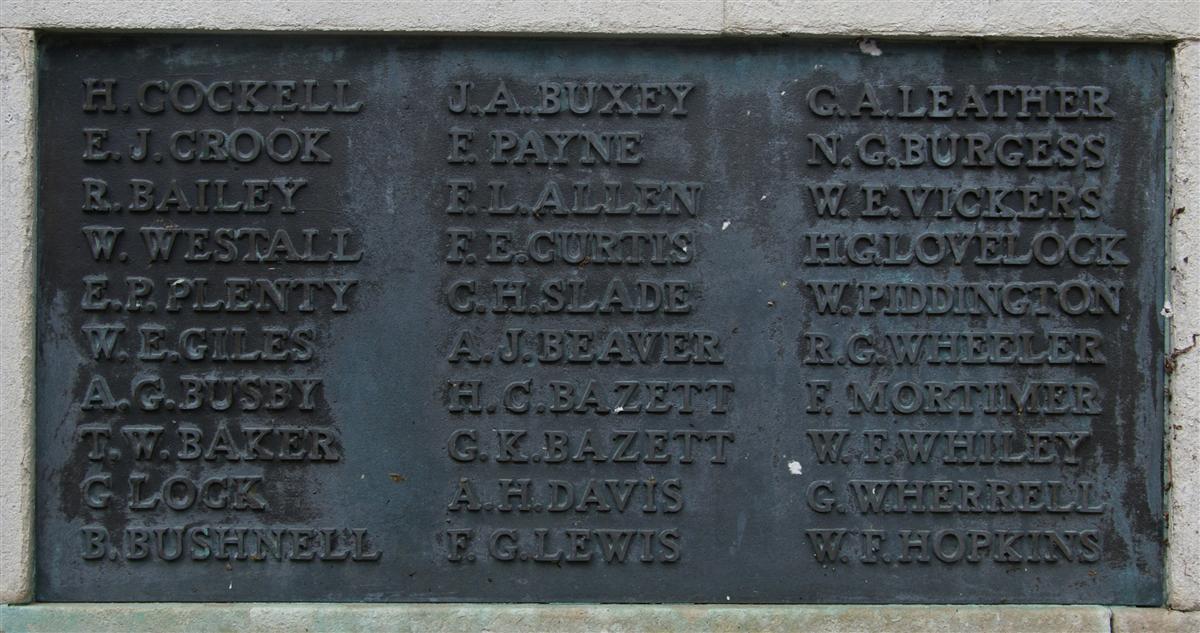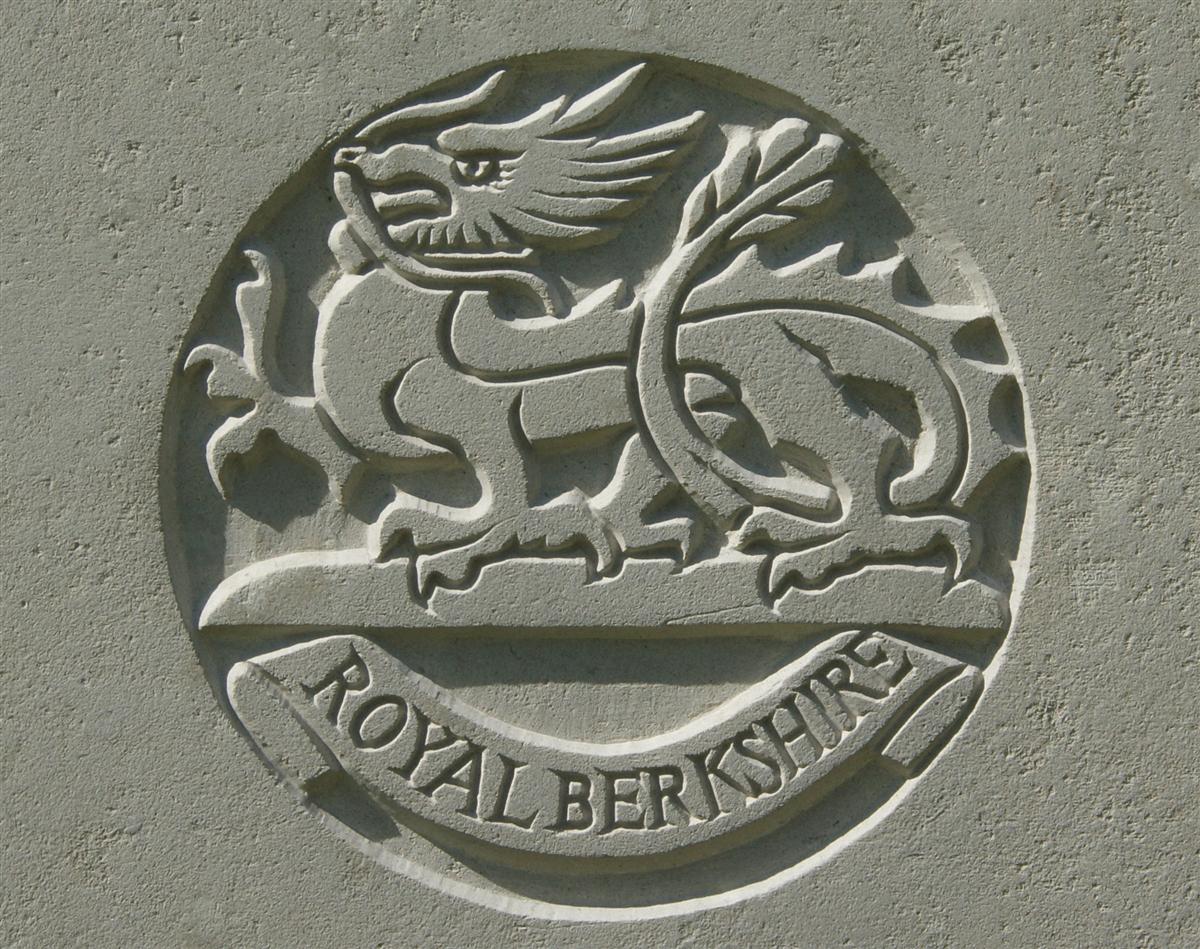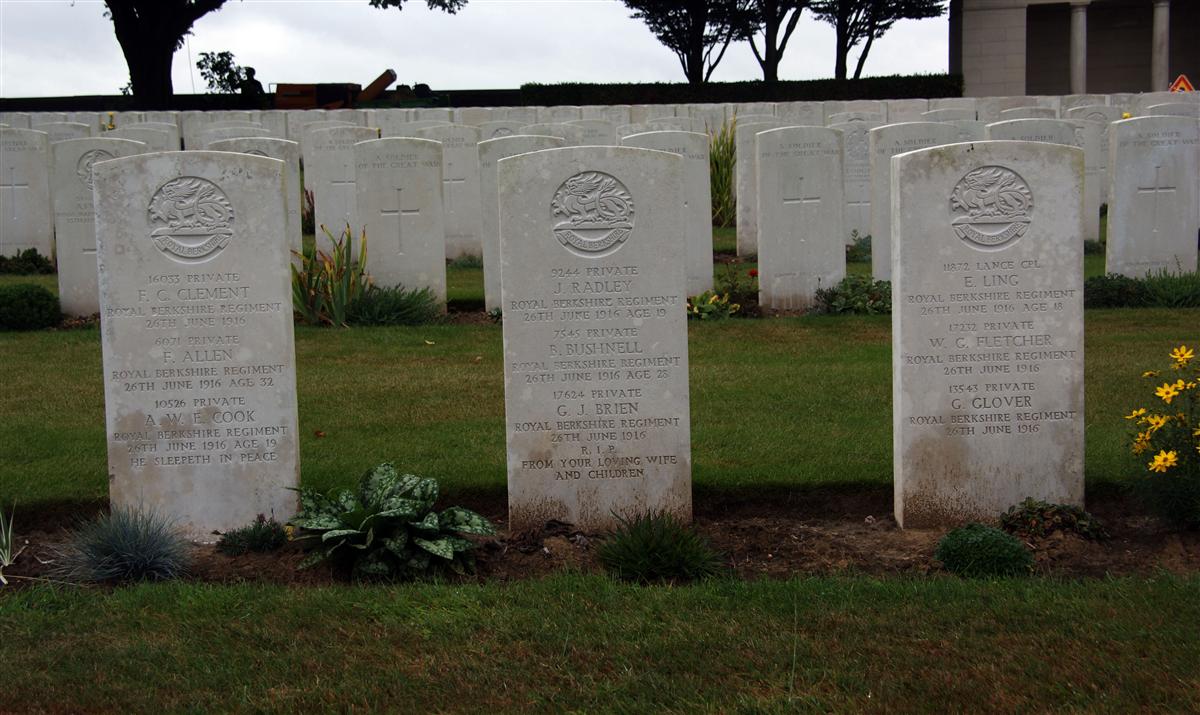Benjamin Bushnell
Private 7545 Benjamin Bushnell, 1st Battalion, Royal Berkshire Regiment

Benjamin's name on Newbury War Memorial (bottom left) |
Following the death of the infant William in 1899 Julia disappears from the family group, the obvious thought is that she died as a result of William’s birth, but her death is not registered at that date. Whatever the cause of Julia’s departure James evidently decided to return to his roots and moved the family moved to Clifton Villas, Newbury, where James found employment as an assurance agent. His sister Mary Ellen was added to the family group as house keeper. Ten years later, in 1901, the family were resident in Hamstead Marshall where James was working as a cobbler; four more young children, nephew and nieces, had been added to the household.
At this date (1901) Benjamin was an unemployed 14 year-old, evidently his prospects were not bright locally so, given his father’s background, it is not surprising that he looked to the Army for a solution. He enlisted with the Royal Berkshire Regiment in 1903 and served with the 2nd Battalion in India. However, he was not among the select group chosen to represent the regiment at the Delhi Durbar in 1911, when the coronation of King George V was marked with a lavish ceremony and a proclamation of the King as Emperor of India.
Benjamin returned to civilian life, probably in 1912 after nine years in uniform (two as a boy soldier and seven as a regular). However, his commitment to serve was not over, he would remain a reservist for a further 5 years.
In 1914 he married Florence Annie Sturgess in Newbury. When war was declared he would, as a reserve, have received his mobilisation papers ordering him to report for duty.

The regimental badge of the Berkshire Regiment, as used on CWGC headstones. |
At this stage of the war the British Expeditionary Force (BEF) was struggling to cover its segment of what was rapidly becoming the infamous trench line of the Western Front. Men had to spend long periods in the firing line or close behind in support positions – all the time within the range of the enemy’s artillery. After over a month of action, fighting, retreating, fighting, advancing, fighting, the battalion that Benjamin joined was exhausted, out of the line for the first time since the fighting began. However, shortage of men meant they were soon back in the line and the war went on.
By 1916 the BEF had grown into a huge force, many times its size in 1914, and was covering a far larger proportion of the line the British sector running from the North Sea to the Somme. Life in general was easier for the infantry than in 1914, there were enough men to allow for the rotation of troops in and out of the front line and for them to spend far less time in the line than they spent in safe billets out of the range of the enemy artillery. All of which made life easier – until it was time to go ‘over the top’, when life suddenly got a lot harder, and, all too often, shorter.
However, life in the trenches was never easy – even when no major offensive was planned there was the enemy shelling and sniping to endure and every now and then the ‘brass’ decided it would be a good idea to raid the enemy trenches, hopefully taking a few captives and gathering intelligence on the state of their defences. The 1st Berks were instructed to undertake such a raid on 26 June 1916 while they were taking their turn in the line near Souchez, north of Arras:
War Diary, 1st Royal Berkshire – 26 June 1916
CARENCY: The party of 100 under Captain WEST which had been withdrawn from the line on the 24th returned at 5pm. This party was to make a raid on the German front line at 11.30pm. (Battalion orders and instructions are attached.), the plan being to make a frontal attack in two waves with 2 officers and 56 other ranks simultaneously with bombing attacks on both flanks along the communication trenches which led into the enemy line. The cutting of their wire had apparently put the Germans on the alert for on the signal being given to advance, a very heavy trench mortar, bombing and machine gun fire was opened and prevented any of our parties reaching their objectives. Casualties in the raiding party were Lieut THORNE missing, Sec Lieut JACKSON wounded, 4 OR’s killed, 1 missing and 21 wounded. Total casualties in the Battn during raid 2 Officers 43 OR’s wounded, killed and missing.
This was the day that Benjamin died, seemingly a victim of the mortar barrage. His death was announced in the local paper a few weeks later:
Newbury Weekly News, 3 August 1916 – Family Notices: Killed in Action
BUSHNELL - 7545, Pte B Bushnell, 1st Royal Berks Regt, killed in action on the 26th of June, fourth son of James Bushnell, Crockham Heath, near Newbury, Berks.
More details followed:
Newbury Weekly News, 10 August 1916 – Local War Notes
Pte B Bushnell, who was killed in action on June 26th, was the fourth son of Mr James Bushnell, of Crockham Heath. He joined the Royal Berks in 1903, and had thirteen years’ service to his credit. He rejoined at the outbreak of war, and was sent out with the Expeditionary Force to France. He was wounded in the left eye in January, 1915, and returned to duty in April. In January, 1916, he suffered with a poisoned arm, but went back to duty in April. He never returned. His wife received letters from the lieutenant of his Company describing how he met his death. He was returning to the trenches when the Germans began shelling. He and two others made for their dug-out, but immediately on reaching it a shell burst, and all three were buried. They were extricated as quickly as possible, but death had been instantaneous. Several relatives are on service, and other casualties have caused sorrow.

Benjamin's headstone flanked by two others - between them marking the final resting place of nine comrades. |
Locally Benjamin is remembered on Tablet 9 of the Newbury Town War Memorial.

Find a memorial :
| Died this day: | |
| 04 March 1919 | |
| Alfred Lewis | |
| East Garston |

Like this site? Show your appreciation through a donation to a great charity.